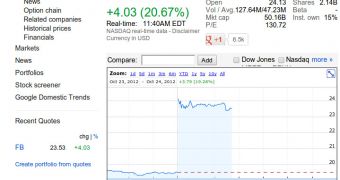Facebook's impressive financial results for the third quarter have created a commotion on Wall Street. The shares that up until yesterday were worthless are now the most attractive on the market. No surprise then that the prices jumped 20 percent as soon as the shares started trading and they're staying high.
The reason for all of this was Facebook's promises and more importantly, its data, that showed mobile wasn't something it didn't know how to do.
It tripled mobile ad revenue in three months, after only six months of mobile ads being run by Facebook. With 600 million people using Facebook from mobile devices every month, the fact that Facebook has proven that it can make money from them is very important.
Still, the sudden jump is even more evidence of the herd mentality that has driven Facebook share prices since the IPO. For reasons that don't make sense to regular people, investors have realized, just after the IPO, that Facebook users are going mobile. Shocking.
Equally shocking to them was that Facebook wasn't making that much money in the mobile space. Well, at the time, it wasn't making any money since it didn't run any mobile ads.
To anyone who has no idea how Facebook or even Silicon Valley works, this would something to worry about.
But it should be assumed that investors pouring thousands, hundreds of thousands or millions of dollars into Facebook would do a bit of a background check and see that Facebook, like any other top notch tech firm, is quick to respond to changes, even if they don't always get it right.
Well, the herd has spoken again and this time it's time to buy. At the moment, Facebook shares are trading at $23.50, $4 above what they were selling for yesterday, a 20 percent jump.
A 20 percent jump in stock price for a multi-billion dollar company, already one of the biggest tech companies in the world, on the minor news that it is making some money from mobile, just like it always said it would and just like it was inevitable it would, is evidence of nothing else but the fact that public investors have no idea what they're doing.

 14 DAY TRIAL //
14 DAY TRIAL //